(完整)九年级语法专题练习-倒装句
九年级英语倒装句专项练习(附答案)

九年级英语倒装句专项练习(附答案)一、倒装句1.——Taking a walk after supper is really a ____ way.——____. It keeps us healthy, too.A. relaxing, So it isB. relaxing, So is itC. relaxed, So it isD. relaxed, So is it【答案】 A【解析】【分析】句意为:---饭后散步确实是放松的办法。
---确实如此。
还可以保持健康。
“so+be动词/助动词/情态动词+主语”属于倒装句肯定形式,表示说话人的行为、动作和前面提到的人的行为、动作相同。
“也”之意;“so+主语+be动词/助动词/情态动词”属于强调句型,表示肯定说话人提到的事是事实,“的确如此”之意。
动词的ed形式表示人的主观感受,动词的ing形式表示事物本身的特性。
结合语境可知应选A。
【点评】考查形容词及固定句型辨析。
2.— I can't stand (忍受) the air pollution in this city any more. It is getting more terrible.— ________. We've never had so many factories before.A. Neither I can .B. Neither can IC. So I can.D. So can I.【答案】 B【解析】【分析】句意:-我不能在忍受这个城市里的空气污染了,它变得更糟糕了。
-我也不能,我们以前从来没有这么多工厂。
Neither也不,是否定意思,位于句首,应该用倒装,故A不对;C和D应该用于肯定句中,这里是否定句。
故选B。
3.—Oh, my god! Recently I have put on 5 pounds.— . I think I should lose weight.A. So do IB. So have IC. Neither do ID. Neither have I【答案】 B【解析】【分析】句意:—啊,我的天呀!最近我长胖了五磅。
初三倒装句练习题

初三倒装句练习题倒装句在英语语法中是一种特殊的语序结构,通常用于强调或表示特定的语意关系。
在初三英语学习中,倒装句的掌握对于提高语言表达能力和理解复杂句子的能力非常重要。
下面是一些初三倒装句练习题,帮助大家更好地掌握倒装句的用法和应用。
练习一:完整倒装句1. They are eating in the restaurant. → ______ ______ they eating?2. She will go to the party next week. → ______ ______ she go to the party next week?3. He can play the piano very well. → ______ ______ he play the piano very well?练习二:部分倒装句将以下句子中划线部分进行倒装。
1. Not only did I finish my homework, but I also cleaned the entire house.2. In the garden stood a beautiful statue of a goddess.3. On top of the table sat a birthday cake with candles.练习三:选择正确的倒装句从括号中选择适当的倒装结构来完成句子。
1. _______(Not only / does she) enjoy playing the guitar, but she also sings very well.2. _______(Little / does he) know about the surprise that we prepared for him.3. _______(Under the tree / sat) a group of students, reading books and chatting.练习四:特殊疑问词倒装将以下句子中划线部分进行倒装。
初三英语倒装句练习题30题

初三英语倒装句练习题30题1<背景文章>Once upon a time in a small town, there lived a young boy named Tom. Not only was Tom very brave, but he was also extremely intelligent. In the town square, there stood a beautiful fountain. Hardly had Tom seen such a magnificent sight before. Only when he was close to the fountain did he realize how truly amazing it was. Under the fountain, there were many colorful fish swimming gracefully. Little did Tom know that an adventure awaited him.One day, as Tom was walking by the fountain, suddenly he heard a strange noise. Never had he heard such a sound. Curious, he decided to investigate. As he walked closer, he saw a small door hidden behind some bushes. Rarely had he found anything so mysterious. He opened the door and entered a dark passage.Inside the passage, there were many twists and turns. No sooner had he taken a few steps than he realized he was lost. But Tom was not afraid. With courage in his heart, he continued to explore. Eventually, he came to a large room filled with treasures.Not until he saw the treasures did he understand the true meaning of his adventure. He knew that he had discovered something truly special.1. Hardly had Tom seen such a magnificent sight before. What does this sentence mean?A. Tom had seen such a magnificent sight many times before.B. Tom had never seen such a magnificent sight before.C. Tom had just seen such a magnificent sight.D. Tom didn't see the magnificent sight.答案:B。
初三英语倒装句练习题50题(答案解析)
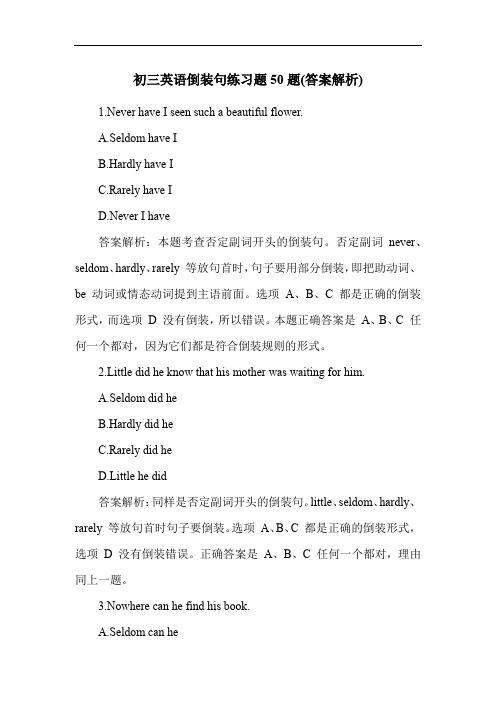
初三英语倒装句练习题50题(答案解析)1.Never have I seen such a beautiful flower.A.Seldom have IB.Hardly have IC.Rarely have ID.Never I have答案解析:本题考查否定副词开头的倒装句。
否定副词never、seldom、hardly、rarely 等放句首时,句子要用部分倒装,即把助动词、be 动词或情态动词提到主语前面。
选项A、B、C 都是正确的倒装形式,而选项D 没有倒装,所以错误。
本题正确答案是A、B、C 任何一个都对,因为它们都是符合倒装规则的形式。
2.Little did he know that his mother was waiting for him.A.Seldom did heB.Hardly did heC.Rarely did heD.Little he did答案解析:同样是否定副词开头的倒装句。
little、seldom、hardly、rarely 等放句首时句子要倒装。
选项A、B、C 都是正确的倒装形式,选项D 没有倒装错误。
正确答案是A、B、C 任何一个都对,理由同上一题。
3.Nowhere can he find his book.A.Seldom can heB.Hardly can heC.Rarely can heD.Nowhere he can答案解析:nowhere 放句首,句子倒装。
选项A、B、C 虽然也是否定副词开头的倒装形式,但与nowhere 意思不同。
选项D 没有倒装错误。
正确答案是nowhere can he,即本题没有其他可替代选项。
4.Not until he came back did I leave.A.Seldom until he came back did I leaveB.Hardly until he came back did I leaveC.Rarely until he came back did I leaveD.Not until he came back I left答案解析:not until 放句首,主句要倒装。
九年级英语 必备英语倒装句技巧全解及练习题(含答案)
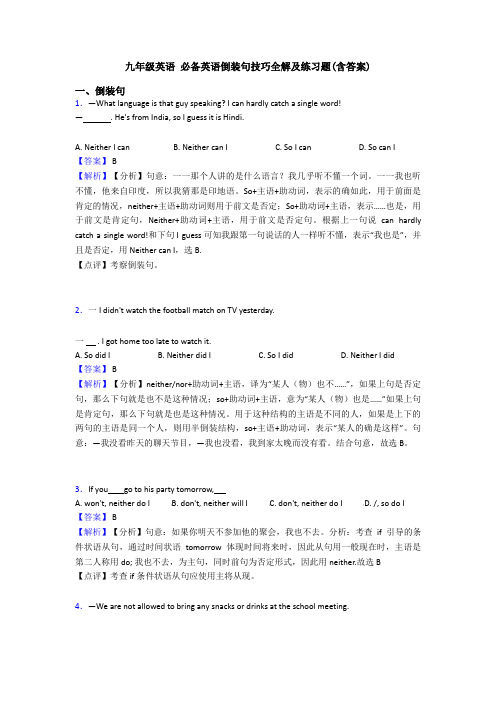
九年级英语必备英语倒装句技巧全解及练习题(含答案)一、倒装句1.—What language is that guy speaking? I can hardly catch a single word!— . He's from India, so I guess it is Hindi.A. Neither I canB. Neither can IC. So I canD. So can I【答案】 B【解析】【分析】句意:一一那个人讲的是什么语言?我几乎听不懂一个词。
一一我也听不懂,他来自印度,所以我猜那是印地语。
So+主语+助动词,表示的确如此,用于前面是肯定的情况,neither+主语+助动词则用于前文是否定;So+助动词+主语,表示……也是,用于前文是肯定句,Neither+助动词+主语,用于前文是否定句。
根据上一句说can hardly catch a single word!和下句I guess可知我跟第一句说话的人一样听不懂,表示“我也是”,并且是否定,用Neither can I,选B.【点评】考察倒装句。
2.一 I didn't watch the football match on TV yesterday.一 . I got home too late to watch it.A. So did IB. Neither did IC. So I didD. Neither I did【答案】 B【解析】【分析】neither/nor+助动词+主语,译为“某人(物)也不……”,如果上句是否定句,那么下句就是也不是这种情况;so+助动词+主语,意为“某人(物)也是……”如果上句是肯定句,那么下句就是也是这种情况。
用于这种结构的主语是不同的人,如果是上下的两句的主语是同一个人,则用半倒装结构,so+主语+助动词,表示“某人的确是这样”。
句意:—我没看昨天的聊天节目,—我也没看,我到家太晚而没有看。
初三英语倒装句练习题50题答案解析版

初三英语倒装句练习题50题答案解析版1. In the middle of the room ____ a large table.A. standsB. standC. standingD. stood答案:A。
解析:完全倒装句的结构是“表语/状语+谓语+主语”。
此句中“in the middle of the room”是地点状语位于句首,句子要用完全倒装。
主语是“a large table”为单数,根据句子时态一般现在时,所以谓语动词用第三人称单数形式stands。
B选项stand用于主语是复数的情况;C选项standing不是谓语形式;D选项stood是一般过去时,不符合句子时态。
2. There ____ a lot of people at the concert last night.A. wasB. wereC. isD. are答案:B。
解析:在“there be”句型中,当表示某地有某物或某人时,be动词的形式取决于后面的主语。
这里“a lot of people”是复数,句子时态是一般过去时,所以要用were。
A选项was用于单数主语;C选项is是一般现在时的单数形式;D选项are是一般现在时的复数形式。
3. Out ____, with a stick in his hand.A. did he rushB. rushed heC. he rushedD. he did rush答案:C。
解析:当表示方位的副词out位于句首时,如果主语是代词,句子不用完全倒装,而是采用正常语序。
这里主语是he,所以是he rushed。
A选项did he rush是部分倒装形式;B选项rushed he 是完全倒装形式,但不适用于主语是代词的情况;D选项he did rush 这种形式不符合正常用法。
4. ____ from the mountain, the city looks very beautiful.A. SeeB. SeenC. SeeingD. To see答案:B。
人教版中考英语九年级英语 【语法专项练习】倒装句专项练习

人教版中考英语九年级英语【语法专项练习】倒装句专项练习一、倒装句1.—I've finished my homework, Tony.—_______.A. So have IB. So I haveC. So did ID. So I did【答案】 A【解析】【分析】句意:托尼,我已经完成了我的作业。
——我也是。
So +助动词+主语,表示同样,也;So+主语+助动词,表示的确,确实。
结合句意,表示也做完了,故排除BD 两项。
根据I've 可知此处的助动词是have, 故选A。
【点评】考查倒装句的用法。
2.—I couldn't work out the math problem.—________. I found ________ difficult for us to do it.A. So could I; thisB. Neither could I; itC. So can I; thatD. Neither I could; it【答案】 B【解析】【分析】句意:——我算不出这道数学题。
——我也不能。
我发现解决这个问题对于我们来说很难。
第一空考查倒装结构,我发现让我们做它很难。
上句发生一件事,下句有同样事情发生时,后面的句子用倒装结构,前面的句子是否定句,后面的倒装句用Neither引导,Neither+助动词+主语。
第二空考查it作形式宾语,主语+谓语+it+形容词+for sb. to do sth.it是形式宾语,动词不定式是真正的宾语,故选B。
【点评】此题考查倒装结构和it用法。
注意neither引导的倒装句用法和固定句式结构:主语+谓语+it+形容词+for sb. to do sth.3.一 I didn't watch the football match on TV yesterday.一 . I got home too late to watch it.A. So did IB. Neither did IC. So I didD. Neither I did【答案】 B【解析】【分析】neither/nor+助动词+主语,译为“某人(物)也不……”,如果上句是否定句,那么下句就是也不是这种情况;so+助动词+主语,意为“某人(物)也是……”如果上句是肯定句,那么下句就是也是这种情况。
初三英语倒装句深度练习练习题20题含答案解析
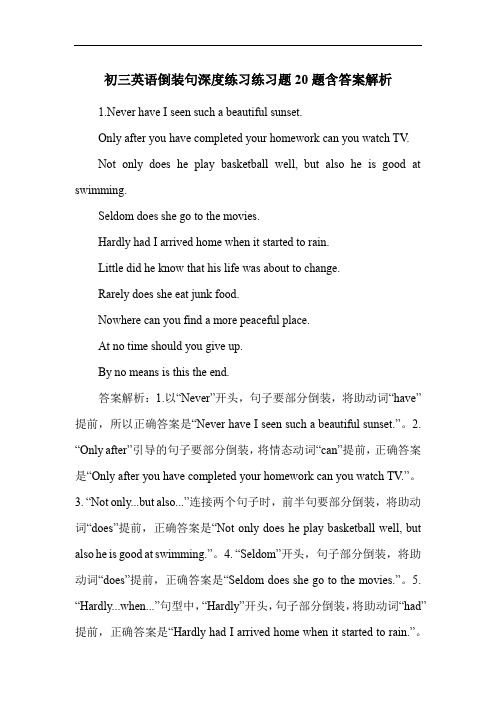
初三英语倒装句深度练习练习题20题含答案解析1.Never have I seen such a beautiful sunset.Only after you have completed your homework can you watch TV.Not only does he play basketball well, but also he is good at swimming.Seldom does she go to the movies.Hardly had I arrived home when it started to rain.Little did he know that his life was about to change.Rarely does she eat junk food.Nowhere can you find a more peaceful place.At no time should you give up.By no means is this the end.答案解析:1.以“Never”开头,句子要部分倒装,将助动词“have”提前,所以正确答案是“Never have I seen such a beautiful sunset.”。
2. “Only after”引导的句子要部分倒装,将情态动词“can”提前,正确答案是“Only after you have completed your homework can you watch TV.”。
3. “Not only...but also...”连接两个句子时,前半句要部分倒装,将助动词“does”提前,正确答案是“Not only does he play basketball well, but also he is good at swimming.”。
4. “Seldom”开头,句子部分倒装,将助动词“does”提前,正确答案是“Seldom does she go to the movies.”。
初三英语倒装句练习题50题含答案解析
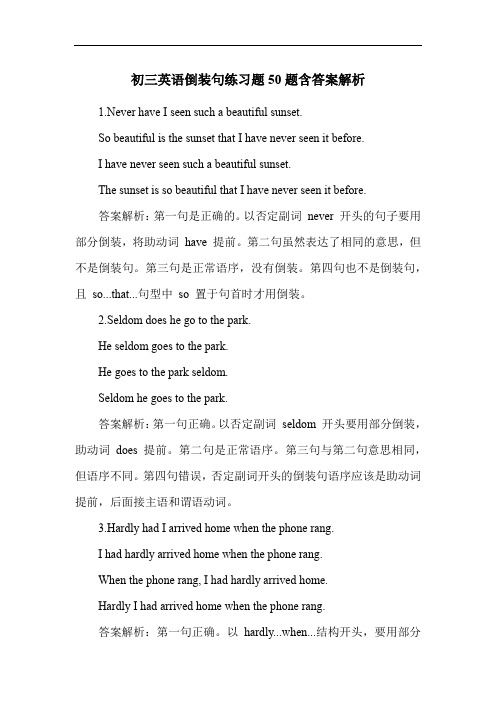
初三英语倒装句练习题50题含答案解析1.Never have I seen such a beautiful sunset.So beautiful is the sunset that I have never seen it before.I have never seen such a beautiful sunset.The sunset is so beautiful that I have never seen it before.答案解析:第一句是正确的。
以否定副词never 开头的句子要用部分倒装,将助动词have 提前。
第二句虽然表达了相同的意思,但不是倒装句。
第三句是正常语序,没有倒装。
第四句也不是倒装句,且so...that...句型中so 置于句首时才用倒装。
2.Seldom does he go to the park.He seldom goes to the park.He goes to the park seldom.Seldom he goes to the park.答案解析:第一句正确。
以否定副词seldom 开头要用部分倒装,助动词does 提前。
第二句是正常语序。
第三句与第二句意思相同,但语序不同。
第四句错误,否定副词开头的倒装句语序应该是助动词提前,后面接主语和谓语动词。
3.Hardly had I arrived home when the phone rang.I had hardly arrived home when the phone rang.When the phone rang, I had hardly arrived home.Hardly I had arrived home when the phone rang.答案解析:第一句正确。
以hardly...when...结构开头,要用部分倒装,将助动词had 提前。
第二句是正常语序。
初三英语倒装句练习题20题(带答案)
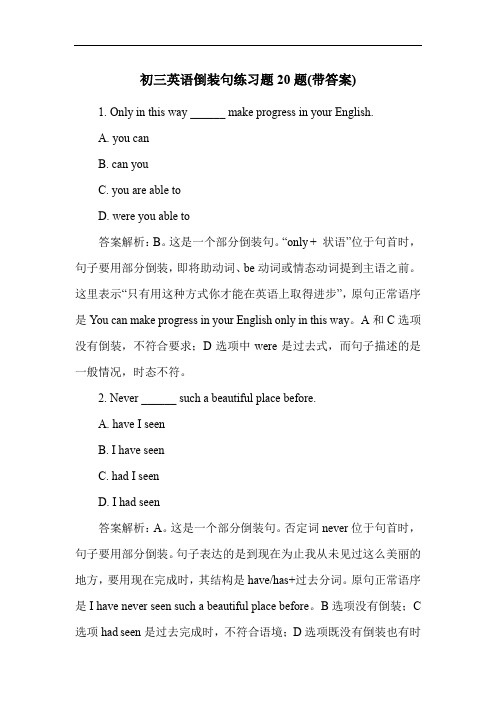
初三英语倒装句练习题20题(带答案)1. Only in this way ______ make progress in your English.A. you canB. can youC. you are able toD. were you able to答案解析:B。
这是一个部分倒装句。
“only + 状语”位于句首时,句子要用部分倒装,即将助动词、be动词或情态动词提到主语之前。
这里表示“只有用这种方式你才能在英语上取得进步”,原句正常语序是You can make progress in your English only in this way。
A和C选项没有倒装,不符合要求;D选项中were是过去式,而句子描述的是一般情况,时态不符。
2. Never ______ such a beautiful place before.A. have I seenB. I have seenC. had I seenD. I had seen答案解析:A。
这是一个部分倒装句。
否定词never位于句首时,句子要用部分倒装。
句子表达的是到现在为止我从未见过这么美丽的地方,要用现在完成时,其结构是have/has+过去分词。
原句正常语序是I have never seen such a beautiful place before。
B选项没有倒装;C 选项had seen是过去完成时,不符合语境;D选项既没有倒装也有时态错误。
3. Here ______ the bus.A. comeB. comesC. comingD. is come答案解析:B。
这是一个完全倒装句。
当表示地点的副词here位于句首时,如果句子的主语是名词,句子要用完全倒装,即谓语动词提到主语之前。
主语the bus是第三人称单数,所以谓语动词用comes。
A选项come没有用第三人称单数形式;C选项coming是非谓语形式,不能作谓语;D选项is come表达错误。
初三英语倒装句试题答案及解析

初三英语倒装句试题答案及解析1.—If you don’t go there,.A.so do I B.so will IC.neither do I D.neither will I【答案】D【解析】句意:如果你不去那,我也不去。
if引导的条件状语从句,主将从现,if引动的从句用一般现在时,所以空缺的主句应该用一般将来时。
而will是将要,表将来。
So+情态动词/助动词/be情态动词/助动词/be动词+主语,表示….也不是。
故选D。
动词+主语。
表示…也是。
Neither+【考点】考查倒装句。
2. If you want to go to the mountains this evening, so ______ I.A. doB. willC. am【答案】B【解析】句意:如果你今天晚上想去山上,我也去. so, neither位于分句或句子的开头,这种结构通常表示前面所说的情况也适合于另一个人(或事物),表示“我也这样”之类的概念。
其句型可归纳为: so / neither + be / have / 助动词 / 情态动词 + 主语。
so, neither开头的倒装句一定要与上句的时态保持一致。
so, neither开头的倒装句中的助动词或情态动词要根据人称的变化而变换。
所以选B。
【考点】考查倒装句。
3. -Jack went to see the man who was in hospital yesterday. -_A.So did he B.So he didC.He did so D.Did so he【答案】B【解析】句意:-Jack昨天去看医院里的那个人了。
-的确是这样。
根据句意可知,这里两个人谈论的都是Jack,主语没有发生变化,因此不用so的倒装结构。
根据句意可知,Jack是昨天去医院的,故选B,这个选项的意思是来肯定前面的人所说的话。
【考点】考查so的用法。
4.Mr. Smith’s never angry with their daughter. __________ Mrs. Smith.A.So is B.So hasC.Neither is D.Neither has【答案】C【解析】句意: 史密斯先生从来不生他们女儿的气。
初三英语倒装句练习题30题

初三英语倒装句练习题30题1.Never have I seen such a beautiful sunset.- I have never seen such a beautiful sunset.- Have I never seen such a beautiful sunset.- Never I have seen such a beautiful sunset.答案解析:第一句正确。
以否定副词never 开头的句子要用部分倒装,即把助动词have 提到主语I 前面。
第二句不是倒装句。
第三句语序错误。
第四句否定副词never 位置错误。
2.Seldom does he go to the library.- He seldom goes to the library.- Does he seldom go to the library.- Seldom he goes to the library.答案解析:第一句正确。
以否定副词seldom 开头的句子要用部分倒装,即把助动词does 提到主语he 前面。
第二句不是倒装句。
第三句语序错误。
第四句否定副词seldom 位置错误。
3.Hardly had she arrived when the meeting began.- She had hardly arrived when the meeting began.- Had she hardly arrived when the meeting began.- Hardly she had arrived when the meeting began.答案解析:第一句正确。
以否定副词hardly 开头的句子要用部分倒装,即把助动词had 提到主语she 前面。
第二句不是倒装句。
第三句语序错误。
第四句否定副词hardly 位置错误。
4.Rarely do they play computer games.- They rarely play computer games.- Do they rarely play computer games.- Rarely they play computer games.答案解析:第一句正确。
初三英语倒装句练习题20题答案解析版

初三英语倒装句练习题20题答案解析版1. Only when the work is done ____ be able to go back home.A. you haveB. you willC. will youD. have you答案:C解析:“only + 状语从句”位于句首时,主句要用部分倒装,即将助动词、be动词或情态动词提到主语之前。
本句中,从句是一般现在时,主句表示将来的动作,所以要用will提到主语you之前。
A和B 选项没有倒装,不符合语法规则。
D选项中have用于完成时态,这里不需要,所以也不正确。
2. Not only ____ interested in football but also ____ good at it.A. he is; he isB. is he; is heC. he is; is heD. is he; he is答案:D解析:“not only...but also...”连接两个分句,当not only位于句首时,第一个分句要用部分倒装,即将be动词、助动词或情态动词提到主语之前,第二个分句不用倒装。
所以第一个空是is he,第二个空是he is。
A选项没有倒装;B选项第二个分句也倒装了,错误;C选项顺序错误。
3. Seldom ____ computer games ever since he entered college.A. did he playB. he playedC. has he playedD. he has played答案:C解析:“seldom”为否定副词,位于句首时句子要用部分倒装。
句子中有“ever since”引导的时间状语从句,主句要用现在完成时。
A选项是一般过去时的倒装形式,不符合时态要求;B选项没有倒装;D 选项没有倒装。
4. So loudly ____ that everyone in the room could hear him clearly.A. did he speakB. he spokeC. was he speakingD. he was speaking答案:A解析:“so + 副词”位于句首时,句子要用部分倒装。
初三英语倒装句练习题40题

初三英语倒装句练习题40题1.Near the house stands a tall tree.- Beside the house stands a tall tree.- In the house stands a tall tree.- On the house stands a tall tree.答案解析:第一句正确。
完全倒装句结构为“表语+谓语动词+主语”。
Near the house 是表语,stands 是谓语动词,a tall tree 是主语。
第二句Beside the house stands a tall tree 与第一句结构相同且正确。
第三句In the house 表地点的状语放在句首一般不用完全倒装,句子错误。
第四句On the house 同理也不适用完全倒装,句子错误。
2.Under the bridge flows a river.- Below the bridge flows a river.- Over the bridge flows a river.- In the bridge flows a river.答案解析:第一句和第二句正确。
Under the bridge 和Below the bridge 都是表语,flows 是谓语动词,a river 是主语,符合完全倒装结构。
第三句Over the bridge 表位置也可以用完全倒装,正确。
第四句In the bridge 表地点在桥里面,一般不用完全倒装,句子错误。
3.In the distance appears a mountain.- At the distance appears a mountain.- On the distance appears a mountain.- To the distance appears a mountain.答案解析:第一句正确。
In the distance 是固定短语表在远处,在句首可以用完全倒装。
初三英语倒装句特殊情况练习题40题含答案解析
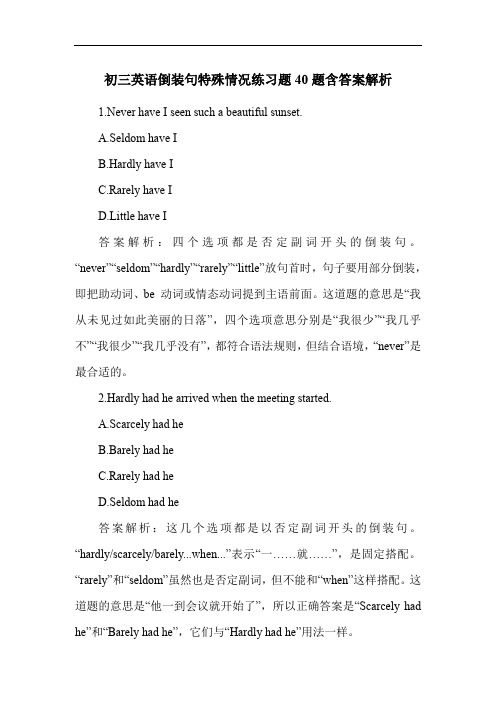
初三英语倒装句特殊情况练习题40题含答案解析1.Never have I seen such a beautiful sunset.A.Seldom have IB.Hardly have IC.Rarely have ID.Little have I答案解析:四个选项都是否定副词开头的倒装句。
“never”“seldom”“hardly”“rarely”“little”放句首时,句子要用部分倒装,即把助动词、be 动词或情态动词提到主语前面。
这道题的意思是“我从未见过如此美丽的日落”,四个选项意思分别是“我很少”“我几乎不”“我很少”“我几乎没有”,都符合语法规则,但结合语境,“never”是最合适的。
2.Hardly had he arrived when the meeting started.A.Scarcely had heB.Barely had heC.Rarely had heD.Seldom had he答案解析:这几个选项都是以否定副词开头的倒装句。
“hardly/scarcely/barely...when...”表示“一……就……”,是固定搭配。
“rarely”和“seldom”虽然也是否定副词,但不能和“when”这样搭配。
这道题的意思是“他一到会议就开始了”,所以正确答案是“Scarcely had he”和“Barely had he”,它们与“Hardly had he”用法一样。
3.Seldom does she go out at night.A.Rarely does sheB.Hardly does sheC.Never does sheD.Little does she答案解析:四个选项都是否定副词开头的倒装句。
“seldom”“rarely”“hardly”“never”都表示否定意义,放句首时句子要用部分倒装。
“little”作为否定副词时,一般不用于这种句式。
初三英语倒装句深度练习练习题20题答案解析版
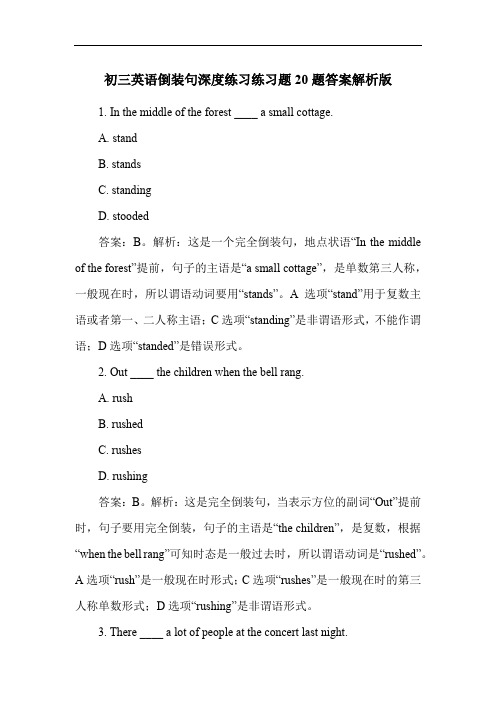
初三英语倒装句深度练习练习题20题答案解析版1. In the middle of the forest ____ a small cottage.A. standB. standsC. standingD. stooded答案:B。
解析:这是一个完全倒装句,地点状语“In the middle of the forest”提前,句子的主语是“a small cottage”,是单数第三人称,一般现在时,所以谓语动词要用“stands”。
A选项“stand”用于复数主语或者第一、二人称主语;C选项“standing”是非谓语形式,不能作谓语;D选项“standed”是错误形式。
2. Out ____ the children when the bell rang.A. rushB. rushedC. rushesD. rushing答案:B。
解析:这是完全倒装句,当表示方位的副词“Out”提前时,句子要用完全倒装,句子的主语是“the children”,是复数,根据“when the bell rang”可知时态是一般过去时,所以谓语动词是“rushed”。
A选项“rush”是一般现在时形式;C选项“rushes”是一般现在时的第三人称单数形式;D选项“rushing”是非谓语形式。
3. There ____ a lot of people at the concert last night.A. wereB. wasC. areD. is答案:A。
解析:这是“there be”结构的完全倒装句,句子的主语是“a lot of people”,是复数,根据“last night”可知时态是一般过去时,所以要用“were”。
B选项“was”用于单数主语;C选项“are”是一般现在时的复数形式;D选项“is”是一般现在时的单数形式。
4. On the wall ____ two beautiful paintings.A. hangsB. hangC. hangedD. hanging答案:B。
初三英语倒装句深度练习练习题20题(答案解析)
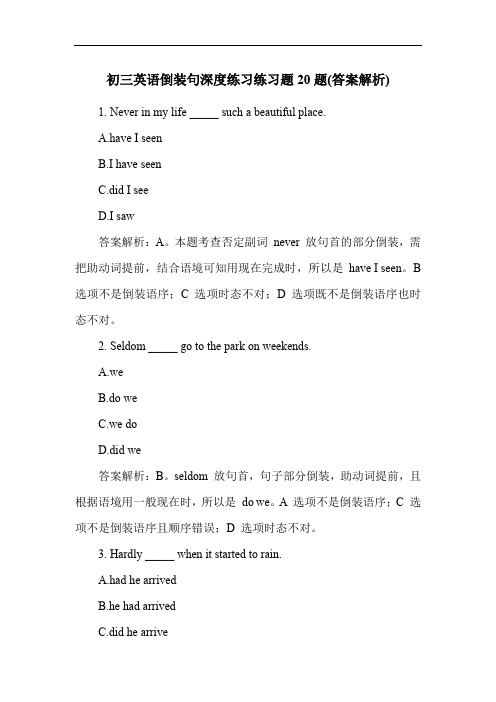
初三英语倒装句深度练习练习题20题(答案解析)1. Never in my life _____ such a beautiful place.A.have I seenB.I have seenC.did I seeD.I saw答案解析:A。
本题考查否定副词never 放句首的部分倒装,需把助动词提前,结合语境可知用现在完成时,所以是have I seen。
B 选项不是倒装语序;C 选项时态不对;D 选项既不是倒装语序也时态不对。
2. Seldom _____ go to the park on weekends.A.weB.do weC.we doD.did we答案解析:B。
seldom 放句首,句子部分倒装,助动词提前,且根据语境用一般现在时,所以是do we。
A 选项不是倒装语序;C 选项不是倒装语序且顺序错误;D 选项时态不对。
3. Hardly _____ when it started to rain.A.had he arrivedB.he had arrivedC.did he arriveD.he arrived答案解析:A。
hardly...when...句型中,hardly 放句首,句子部分倒装,且通常用过去完成时,所以是had he arrived。
B 选项不是倒装语序;C 选项时态不对;D 选项既不是倒装语序也时态不对。
4. Rarely _____ late for school.A.am IB.I amC.do I beD.I be答案解析:A。
rarely 放句首,句子部分倒装,结合be late for 的用法,用am I。
B 选项不是倒装语序;C 选项语法错误;D 选项不是倒装语序且语法错误。
5. Never before _____ so many people interested in English learning.A.have been thereB.there have beenC.there areD.are there答案解析:A。
九年级英语倒装句专题(含答案)
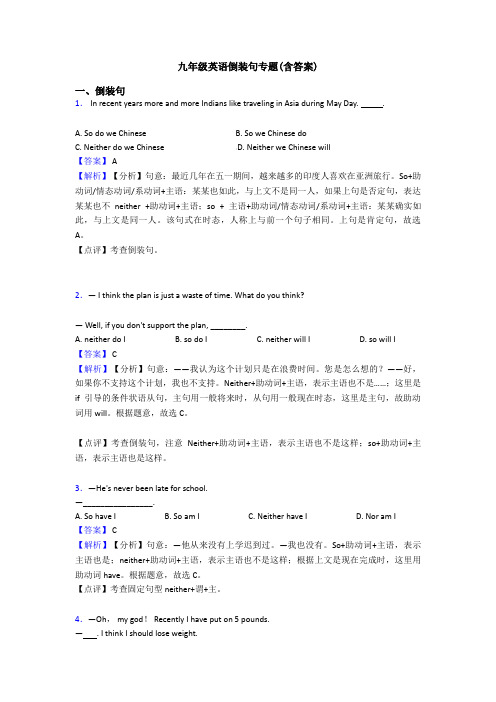
九年级英语倒装句专题(含答案)一、倒装句1. In recent years more and more Indians like traveling in Asia during May Day. .A. So do we ChineseB. So we Chinese doC. Neither do we ChineseD. Neither we Chinese will【答案】 A【解析】【分析】句意:最近几年在五一期间,越来越多的印度人喜欢在亚洲旅行。
So+助动词/情态动词/系动词+主语:某某也如此,与上文不是同一人,如果上句是否定句,表达某某也不neither +助动词+主语;so + 主语+助动词/情态动词/系动词+主语:某某确实如此,与上文是同一人。
该句式在时态,人称上与前一个句子相同。
上句是肯定句,故选A。
【点评】考查倒装句。
2.— I think the plan is just a waste of time. What do you think?— Well, if you don't support the plan, ________.A. neither do IB. so do IC. neither will ID. so will I【答案】 C【解析】【分析】句意:——我认为这个计划只是在浪费时间。
您是怎么想的?——好,如果你不支持这个计划,我也不支持。
Neither+助动词+主语,表示主语也不是……;这里是if引导的条件状语从句,主句用一般将来时,从句用一般现在时态,这里是主句,故助动词用will。
根据题意,故选C。
【点评】考查倒装句,注意Neither+助动词+主语,表示主语也不是这样;so+助动词+主语,表示主语也是这样。
3.—He's never been late for school.—________________.A. So have IB. So am IC. Neither have ID. Nor am I【答案】 C【解析】【分析】句意:—他从来没有上学迟到过。
九年级英语倒装句专项及解析
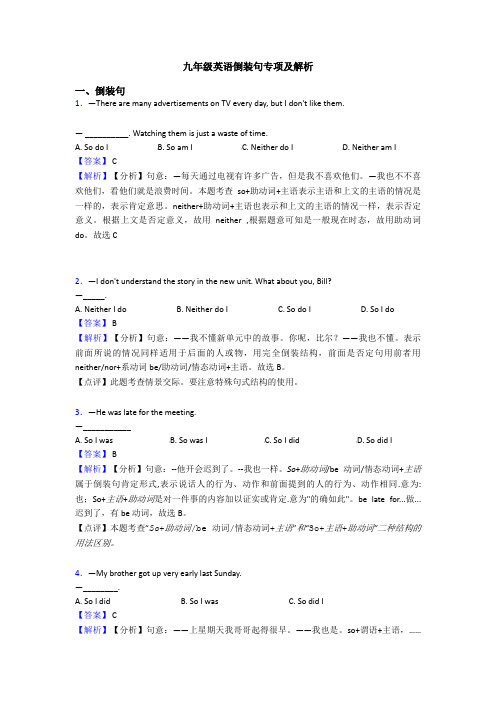
九年级英语倒装句专项及解析一、倒装句1.—There are many advertisements on TV every day, but I don't like them.— __________. Watching them is just a waste of time.A. So do IB. So am IC. Neither do ID. Neither am I【答案】 C【解析】【分析】句意:—每天通过电视有许多广告,但是我不喜欢他们。
—我也不不喜欢他们,看他们就是浪费时间。
本题考查so+助动词+主语表示主语和上文的主语的情况是一样的,表示肯定意思。
neither+助动词+主语也表示和上文的主语的情况一样,表示否定意义。
根据上文是否定意义,故用neither ,根据题意可知是一般现在时态,故用助动词do。
故选C2.—I don't understand the story in the new unit. What about you, Bill?—_____.A. Neither I doB. Neither do IC. So do ID. So I do【答案】 B【解析】【分析】句意:——我不懂新单元中的故事。
你呢,比尔?——我也不懂。
表示前面所说的情况同样适用于后面的人或物,用完全倒装结构,前面是否定句用前者用neither/nor+系动词be/助动词/情态动词+主语。
故选B。
【点评】此题考查情景交际。
要注意特殊句式结构的使用。
3.—He was late for the meeting.—___________A. So I wasB. So was IC. So I didD. So did I【答案】 B【解析】【分析】句意:--他开会迟到了。
--我也一样。
So+助动词/be动词/情态动词+主语属于倒装句肯定形式,表示说话人的行为、动作和前面提到的人的行为、动作相同.意为:也;So+主语+助动词是对一件事的内容加以证实或肯定.意为"的确如此"。
初三英语倒装句特殊情况练习题30题答案解析版

初三英语倒装句特殊情况练习题30题答案解析版1. Only when he ______ the importance of English ______ hard at it.A. realize; will he workB. realizes; he will workC. realizes; will he workD. will realize; he will work答案:C解析:only + 状语从句位于句首时,主句要用部分倒装,从句不倒装。
从句中主语是he,一般现在时,谓语动词用realizes。
主句部分倒装,将will提到主语he之前。
A选项realize形式错误,B选项主句没有倒装,D选项从句不需要用将来时且主句没有倒装。
2. Not until the rain stopped ______ out to play.A. he wentB. did he goC. he did goD. went he答案:B解析:not until位于句首时,句子要部分倒装。
原句正常语序是He didn't go out to play until the rain stopped,部分倒装就是把助动词did提前,主语he放在后面,动词用原形go。
A选项没有倒装,C选项语序错误,D选项是完全倒装的形式,不符合要求。
3. So loudly ______ that everyone in the room could hear him clearly.A. he spokeB. spoke heC. did he speakD. he did speak答案:C解析:so + 副词位于句首时,句子要部分倒装。
原句是He spoke so loudly that everyone in the room could hear him clearly,部分倒装时把助动词did提前,主语he放在后面,动词用原形speak。
- 1、下载文档前请自行甄别文档内容的完整性,平台不提供额外的编辑、内容补充、找答案等附加服务。
- 2、"仅部分预览"的文档,不可在线预览部分如存在完整性等问题,可反馈申请退款(可完整预览的文档不适用该条件!)。
- 3、如文档侵犯您的权益,请联系客服反馈,我们会尽快为您处理(人工客服工作时间:9:00-18:30)。
语法练习-倒装句一、单项选择(共99小题;共99分)1. --- Peter, I will visit our teacher this Sunday.--- . Let's go together.A. Nor do IB. I will soC. So will I2. --- Peter doesn't know many people here.--- .A. So do IB. So am IC. Neither am ID. Neither do I3. --- I hope the summer vacation will come soon.--- . It's really relaxing.A. So I didB. So I doC. So did ID. So do I4. --- My brother and I will go to the library tomorrow.--- . Shall we go together?A. So I doB. So do IC. So will ID. So I will5. --- I like eating sweets.--- . That's probably why I'm getting fatter and fatter.A. So I doB. So do IC. So am I6. I can't play the piano, and .A. neither can my sisterB. my sister can't, tooC. so can't my sisterD. can my sister, either7. --- Did you go to Nancy's birthday party last night?--- Yes. I did. .A. So did TimB. So Tim didC. Tim did soD. Tim went so8. --- Would you like to go to the amusement park?--- If Jack does, .A. I go, tooB. so will IC. neither will ID. so do I9. --- I like to spend time with my friends.--- .A. So am IB. So do IC. So I amD. So I do10. --- Zhou Ming likes reading English magazines.--- . It's good for English learning.A. So do IB. So am IC. So I doD. So I am11. His father likes going hiking. .A. So does his motherB. So is his motherC. So his mother isD. So his mother does12. Li Xin thinks Yao Ming is becoming the most famous basketball player in the world. .A. So am IB. So do IC. So I doD. So I am13. My younger brother couldn't work out the answer and .A. so could IB. nor could IC. so can ID. nor I could14. --- When I was five, I drew very well.--- .A. So did IB. So was IC. So I wasD. So I did15. --- I don't like documentaries.--- .A. So do IB. So I doC. Neither do ID. Either do I16. Hey, Nick. comes the last bus! Hurry up, or we'll have to walk home.A. ThisB. ThereC. ThatD. It17. Mr. Smith's never angry with their daughter. Mrs. Smith.A. So isB. So hasC. Neither isD. Neither has18. --- I am crazy about chocolate.--- . That's probably why I am becoming fatter and fatter.A. So I amB. So I doC. So do ID. So am I19. --- When I was young, I liked playing with toy animals.--- .A. So I wasB. So was IC. So did ID. So I did20. --- Lily and I will go to the old people's home this weekend.--- . Can I join you?A. So will IB. So I willC. So do ID. So I do21. like traveling by himself, but also he enjoys trips with his friends.A. Not only does JackB. Not only JackC. Not only can JackD. Not only did Jack22. Our town has changed a lot, .A. so his hasB. so has hisC. so is hersD. so has he23. --- Edward likes foreign films a lot.--- does Henry.A. NeitherB. NorC. SoD. But24. --- I haven't seen the interesting movie Let the Bullet(子弹) Fly.--- .A. Neither have IB. So have IC. Neither I haveD. So I have25. --- I won't go to the party tomorrow afternoon.--- . I have to do my homework.A. So will IB. Neither will IC. Neither I willD. So I will26. Not until the early years of the 19th century what heat is.A. man did knowB. man knowC. didn't man knowD. did man know27. John likes walking in the open air. .A. So does TomB. Also does TomC. Tom likes alsoD. So Tom does28. --- Mary likes playing baseball very much.--- .A. So does AmyB. So Amy isC. So Amy doesD. So is Amy29. --- I have finished my homework.--- .A. So I haveB. So I doC. So have ID. So do I30. My friend didn't go out this Sunday because of the bad weather and .A. so did IB. neither did IC. neither I didD. so I did31. Come here, Kate. for you.A. Here is some applesB. Here are some applesC. Some apples is hereD. Some apples are here32. --- Bob, I like the film Let the Bullets Fly (让子弹飞). What about you?--- .A. So am IB. So do IC. So I amD. So I do33. --- I usually go to school on foot. And you?--- .A. So do IB. So I haveC. Nor do ID. Neither have I34. --- He has many books on science.--- .A. So I haveB. So I doC. So do I35. Peter has never been to Beijing. .A. So has his fatherB. Neither has his fatherC. His father has been to Beijing,tooD. Neither hasn't his father36. --- Will you go shopping tonight?--- If you go, .A. so do IB. so will IC. neither do ID. neither will I37. --- I haven't visited the Summer Palace yet.--- has my mother. I will take her there this summer holiday.A. SoB. EitherC. NeitherD. None38. --- Oh, I went to the museum last Sunday.--- . And I met Jackie Chan in it.A. So did IB. So I didC. So am ID. So I am39. --- Tom has seen the film before.--- .A. So have IB. So I haveC. So did ID. So I did40. --- I usually go shopping at weekends. And you?--- .A. So I doB. So do IC. So am ID. So I am41. --- My mother and I will go to Shanghai this summer.--- . Shall we go together?A. So do IB. So can IC. So am ID. So will I42. Only by studying hard improve your English soon.A. you canB. you didC. can youD. did you43. --- She likes singing and dancing.--- .A. So do IB. So I doC. So am ID. So I am44. --- I haven't seen the film where are we going, Dad? (《爸爸去哪儿》).--- .A. Neither have IB. So have IC. Neither I haveD. So I have45. --- My mother likes reading.--- .A. So Lily's mother doesB. So does Lily's motherC. So Lily's mother isD. So is Lily's mother46. Yao Ming works hard on his English and .A. so Liu Xiang doesB. so is Liu XiangC. so does Liu XiangD. so Liu Xiang is47. --- My elder sister doesn't like skating.--- .A. So I don'tB. So do IC. Neither I don'tD. Neither do I48. --- I don't like rainy days.--- . Rainy days always make me sad.A. Neither do IB. So do IC. Neither I doD. So I do49. --- He went to see the man who was in hospital yesterday.--- .A. So did weB. So we didC. We did soD. Did so we50. --- He didn't stay up late last night.--- .A. Neither did IB. So didn't IC. So did I51. --- He doesn't like the job because it's kind of dangerous.--- do I.A. EitherB. NeitherC. So52. --- I'm not going swimming tomorrow afternoon.--- . I have to clean up my bedroom.A. So am IB. Neither am IC. Neither I amD. So I am53. Andy never breaks the school rules. . They behave well at school.A. So Rosa doesB. So does RosaC. Neither Rosa doesD. Neither does Rosa54. --- What language is that guy speaking? I can hardly catch a single word!--- . He's from India, so I guess it is Hindi.A. Neither I canB. Neither can IC. So I canD. So can I55. --- I'm going to an amusement party.--- .A. So am IB. So are youC. So you areD. So I am56. --- I like going to the cinema. What about you?--- .A. So am IB. So I doC. So do ID. So did I57. --- I've given all my pocket money to the people in Sichuan.--- I hope they can get over the difficulties they are meeting.A. So am IB. So have IC. So I haveD. So I am58. --- I'm going to play basketball after school. What about you?--- .A. Yes, basketball is very popular.B. Are you?It's so hot!C. I like basketball very much.D. So am I.59. --- He doesn't like the job because it's kind of boring.--- do I.A. EitherB. NeitherC. SoD. Both60. --- I haven't seen the film Pirates of the Caribbean: On Stranger Tides.--- .A. Neither have IB. So have IC. Neither I haveD. So I have61. --- Tom, I'm watching a football match. What about you?--- .A. So am IB. So do IC. So I doD. So I am62. --- I usually have milk and bread for breakfast.--- .A. So have IB. So do IC. I have soD. I do so63. --- My parents never stop going on about (唠叨) how I should study hard.--- .A. So my parents doB. Nor my parents doC. Nor do my parentsD. So do my parents64. --- Mr. Brown is a hardworking man and he has achieved great success.--- .A. So is Mr. GreenB. So has Mr. GreenC. It's the same with Mr. Green65. If you go to the theatre this evening, so I.A. willB. shouldC. doD. am66. --- I never drink coffee.--- .A. So do IB. So did IC. Neither did ID. Neither do I67. --- I like reading interesting stories.--- .A. I do like themB. The same to youC. So do I68. --- They go to school early in the morning.--- .A. So do TomB. So Tom doC. So does TomD. So Tom does69. --- My brother and I will go to the library tomorrow.--- . Shall we go together?A. So am IB. So do IC. So I amD. So will I70. Mary sings English songs well and .A. Jane does tooB. either does JoesC. so Janes doesD. so does Jane71. --- I really hate to go to such a noisy place.--- .A. So am IB. So do IC. So have ID. So can I72. --- I have never been to Hawaii. What about Mike?--- .A. So has heB. So he doesC. Neither he hasD. Neither has he73. --- Peter shut his mouth at the meeting all the time. How about Tom?--- .A. He does soB. He did soC. So does heD. So did he74. --- She has never been to any foreign countries.--- .A. So do IB. So have IC. Neither do ID. Neither have I75. Mike finished the work quickly, and .A. So Tom didB. So did TomC. So was TomD. So Tom was76. I like swimming and .A. So he likesB. So he isC. So does heD. So he does77. --- Peter has made great progress in math recently.--- , and so have you.A. So he doesB. So he hasC. So has heD. So does he78. --- Taian is a really comfortable city to live in.--- , and it's world famous for Mount Tai.A. So it isB. So is itC. So it doesD. So does it79. --- I usually have milk and bread for breakfast.--- .A. So do IB. So I doC. So am ID. So have I80. --- I'd like to go to the pop concert!--- .A. So do IB. So would IC. So I wouldD. So I do81. ---John likes collecting stamps in his free time.--- .A. So he doesB. So he likesC. So Tom doesD. John likes so82. --- I have changed my job.---A. So do IB. So have IC. So I doD. So I have83. --- Linda's passed the chemistry exam.--- .A. So Jane isB. So Jane hasC. So is JaneD. So has Jane84. --- Will your brother go to the party?--- If I go, .A. so does heB. so will heC. so he doesD. so he will85. If he goes there tomorrow, .A. so I amB. so am IC. so I willD. so will I86. --- Tom didn't go to school yesterday.--- .A. So did IB. Neither did IC. So don't ID. Neither don't I87. --- I didn't catch the train this morning.--- did I.A. SoB. EitherC. AsD. Nor88. --- I didn't watch Sochi Winter Olympics.--- . I think it is too cold in Russia.A. So I doB. Neither do IC. Neither did ID. So did I89. We've had two English lessons since this morning. And they.A. so didB. so haveC. neither didD. neither have90. --- I never do my homework carefully.---A. So do IB. I am, tooC. I am not, tooD. Neither do I91. Jim will go shopping. .A. So will IB. So I willC. So do ID. So I do92. --- Mr. Xue is never late for class.---A. So is Miss ZhouB. Nor is Miss ZhouC. So is Mr. XueD. Neither is Mr. Xue93. Life is always changing, and languages.A. so doB. so wereC. so didD. so are94. --- He likes travelling by train.--- .A. So do IB. I dosC. I like soD. I like it, neither95. --- I have never been to European countries. What about you?--- .A. So do IB. So have IC. Neither do ID. Neither have I96. --- Will you come to my party this Sunday?--- If Tom does, .A. so do IB. so I doC. so will ID. so I will97. --- I need a stamp to mail my letter.--- .A. So do IB. So do meC. I, tooD. So I do98. --- I can't dance.--- .A. Either has sheB. Neither can sheC. Neither did ID. So can she99. Jim works hard on his Chinese and .A. so Lucy doesB. so is LucyC. so does LucyD. so Lucy is 答案一、单项选择1. C2. D3. D4. C5. B6. A7. A8. B9. B 10. A11. A 12. B 13. B 14. A 15. C16. B 17. C 18. D 19. C 20. A21. A 22. B 23. C 24. A 25. B26. D 27. A 28. A 29. C 30. B31. B 32. B 33. A 34. C 35. B36. B 37. C 38. A 39. A 40. B41. D 42. C 43. A 44. A 45. B46. C 47. D 48. A 49. A 50. A51. B 52. B 53. D 54. B 55. A56. C 57. B 58. D 59. B 60. A61. A 62. B 63. C 64. C 65. A66. D 67. C 68. C 69. D 70. D71. B 72. D 73. D 74. D 75. B76. C 77. B 78. A 79. A 80. B81. A 82. B 83. D 84. B 85. D86. B 87. D 88. C 89. B 90. D91. A 92. B 93. D 94. A 95. D96. C 97. A 98. B 99. C。
